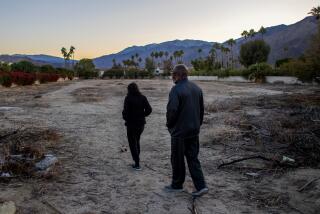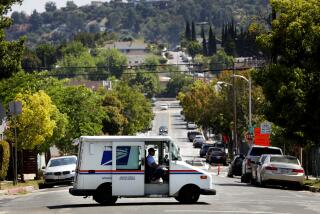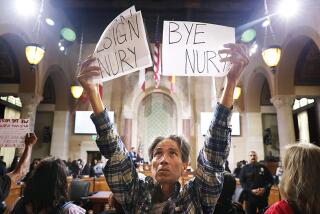New Orleans’ Racial Future Hotly Argued
- Share via
WASHINGTON — President Bush’s housing secretary has touched off a tempest by saying that a revived New Orleans may no longer be a majority-black city and that some of the low-lying and predominantly black neighborhoods probably should not be rebuilt.
Housing and Urban Development Secretary Alphonso Jackson, who is black, said that he expected New Orleans -- a city of about 475,000 that was two-thirds black before Hurricane Katrina hit in late August -- to emerge only 35% to 40% black and with possibly 350,000 residents.
“Whether we like it or not, New Orleans is not going to be 500,000 people for a long time,” Jackson told the Houston Chronicle, which published his comments Thursday. “New Orleans is not going to be as black as it was for a long time, if ever again.”
Other black leaders said Jackson’s remarks would serve only to alienate Katrina’s African American victims. Some housing experts said the remarks indicated the absence of an administration policy on providing affordable housing for tens of thousands of displaced families.
Jackson took to task black activists who have been criticizing the administration. “I wish that the so-called black leadership would stop running around this country, like Jesse [Jackson] and the rest of them, making this a racial issue,” he told the Chronicle.
The Rev. Jesse Jackson, who was in Detroit to meet with displaced New Orleans families, said the housing secretary’s comments would make evacuees feel unwelcome when they went back to New Orleans, which they wanted to do.
“The displaced persons have a right to return home,” the Rev. Jackson said. He accused the housing secretary of promoting the gentrification of one of America’s historic cities.
The Rev. Jackson also found a political overtone to the housing secretary’s prediction, citing black voters’ important role in the elections of such Louisiana Democrats as U.S. Rep. William J. Jefferson, U.S. Sen. Mary Landrieu and Gov. Kathleen Babineaux Blanco.
Secretary Jackson said in his interview with the Chronicle that he had told New Orleans Mayor C. Ray Nagin that “I think it would be a mistake to rebuild the 9th Ward,” a largely black area mostly below sea level.
Any new buildings, the secretary said, should perhaps be on stilts, with parking places at ground level.
He admitted that Nagin did not respond warmly. “He wants to rebuild it like it was,” the secretary said, “and I don’t think I can give the president that kind of advice.”
Bush has said that “urban homesteading” -- in which evacuees would get free federal land in return for a pledge to build homes on it -- could help bring low-income residents back to New Orleans.
“We want evacuees to come home, for the best of reasons,” Bush said in a Sept. 15 speech in New Orleans: “because they have a real chance at a better life in a place they love.”
Housing expert Bruce Katz, who was HUD chief of staff under President Clinton and is now with the centrist Brookings Institution think tank, said federal properties in New Orleans were too few -- perhaps 1,000--to make much of a dent in the need.
Besides, “the worst thing we can do is re-create New Orleans exactly as it was,” Katz said. “It was a failure across the board” -- particularly its concentration of federally subsidized housing near downtown.
He suggested instead that New Orleans’ displaced be involved in planning and be guaranteed the right to return.
Michael Franc, vice president for government relations at the conservative Heritage Foundation think tank, agreed with Katz on the need to avoid replicating the old New Orleans. But he called the administration’s homesteading idea “an enormous step in the right direction.”
He said it was wrong for Alphonso Jackson or anyone else to make the reconstruction of New Orleans a racial issue. “It ought to be about people, not race,” he said.
More to Read
Sign up for Essential California
The most important California stories and recommendations in your inbox every morning.
You may occasionally receive promotional content from the Los Angeles Times.













